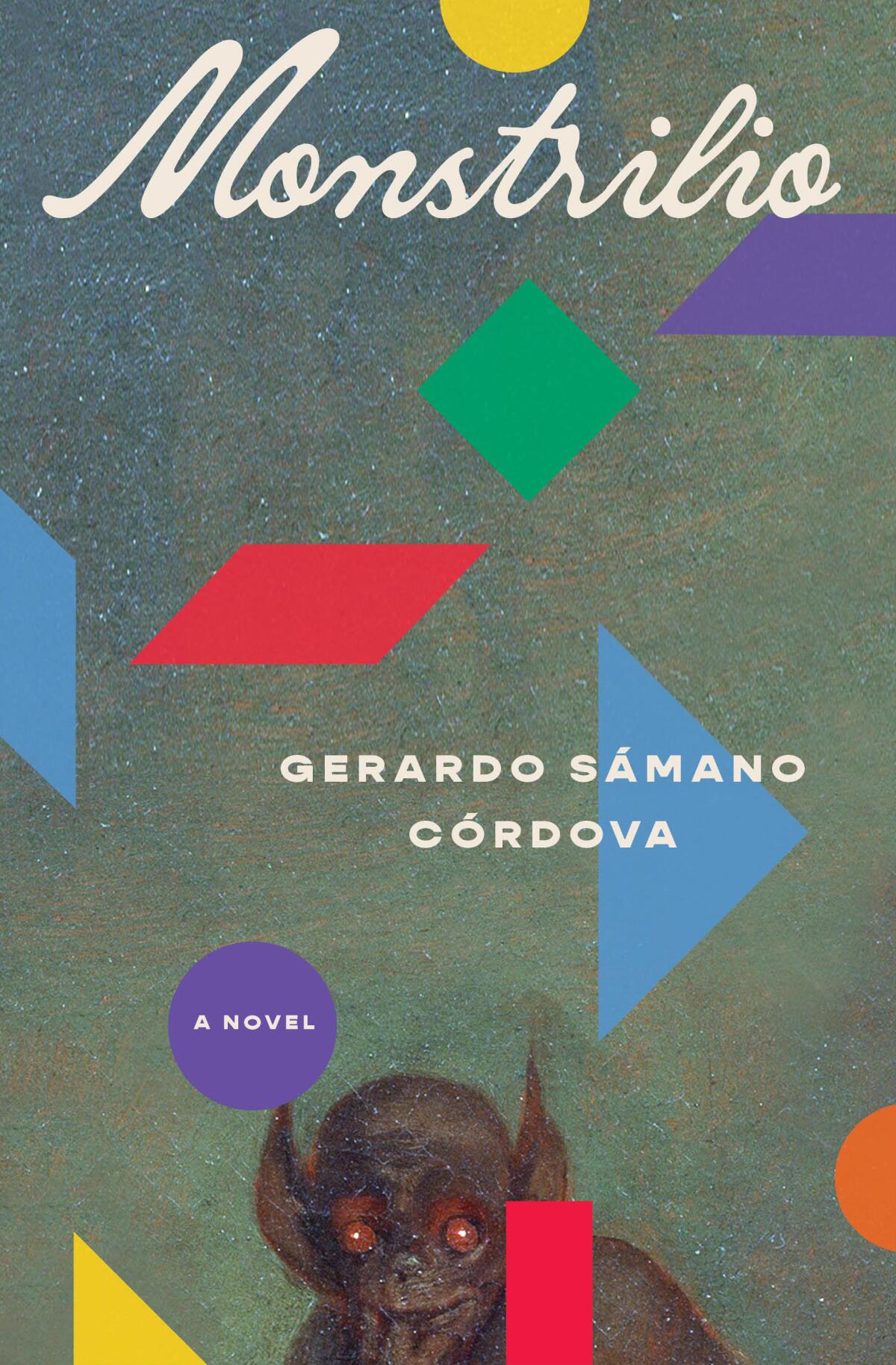How a Mexican-born debut novelist created a beautiful monster

- Share via
Review
Monstrilio
By Gerardo Sámano Córdova
Zando, 336 pages, $27
If you buy books linked on our site, The Times may earn a commission from Bookshop.org, whose fees support independent bookstores.
“Monstrilio,” a debut novel by Gerardo Sámano Córdova, is aptly titled — an unearthly hybrid that’s part horror, part literary meditation on grief, part wildly entertaining tale of an impossible being forced to live in the shadow of the dead boy he replaced. At once heartbreaking and unapologetically strange, this is a cross-cultural, syncretic, folksy, razor-sharp narrative about the horrors of grief and the eternal debate over nature versus nurture.
Santiago, the son of Mexican immigrants, was born in New York City with only one small, misshapen lung; not expected to survive the night, he miraculously lived for 11 years. When death finally finds Santiago, his mother, Magos, cuts her son open with a kitchen knife and slices off a small chunk of his deformed lung before moving back to Mexico with her mother and leaving behind her husband, Joseph.
Magos hears a folktale about a boy grown from a heart and, acting purely out of instinct and desperation, keeps the organ fragment in a jar and feeds it drops of chicken broth until it gains sentience. It grows eyes, hair and a tail-like appendage it uses to move around. Before long, Monstrilio emerges — not Santiago, but a furry blob that fills the space Santiago left behind. Monstrilio eventually becomes M., who resembles Santiago, but with a patch of fur on his forehead and pointy teeth, possessing brutal instincts he must fight to control, if he can.
Bay Area novelist Ingrid Rojas Contreras tells of how a head injury led her to revisit the shamans in her life — and her native Colombia.
The bulk of this development is covered in the first of “Monstrilio’s” four parts, each of them with a different narrator. The second part is told by Lena, a young surgeon and good friend of Magos who, for a time, was in love with her. She has trouble sleeping and relies on baths administered by sex workers. Her life is upended when Magos comes to live with her after Monstrilio attacks her mother. Joseph, meanwhile, returns to Mexico and quickly adopts Monstrilio. He narrates the third part of the book — beginning with an affair with a man back in New York — describing secrets, new love and the impossibility of change.

The first part is a superb introduction, the second an exploration of love and loneliness, the third a slightly meandering look at the way we rebuild after a huge loss. But the last part is the crowning jewel of this unique novel. Narrated by M. with an impeccable economy of language, “Monstrilio’s” closing section takes readers deep into the psyche of a being in perpetual battle against a hunger that is inhuman — and all too human. It chronicles M.’s first job and his first sexual experience with the young man who becomes his boyfriend. He also takes up smoking.
“Monstrilio” packs in a lot, and the author pulls it off brilliantly. It is at once dark and tender, at times bleak, but balanced with humor that borders on slapstick (when Monstrilio attacks his grandmother, there’s blood but also chaos and unexpected hilarity). And the narrative, which weaves through New York City, Mexico City, Berlin and back, seeds a staggering amount of ideas within a blend of gory horror and familial drama, bound together with prose that is often beautiful despite the subject matter, permeated with tension, sadness and the constant threat of mutilation and murder.
Bora Chung’s story collection, ‘Cursed Bunny,’ melds horror tropes with literary aspirations. The best of her tales are as eerie and deep as Kafka’s.
Sámano Córdova’s work possesses classic horror DNA, including Stephen King’s “Pet Sematary” and some of the humor of films like “Little Shop of Horrors.” But its unique perspective and diverse cast of characters puts him in league with a growing movement of writers including Carmen Maria Machado, Stephen Graham Jones, V. Castro, Maríana Enriquez, Eric LaRocca and Erika T. Wurth — writers who wring fresh interpretations out of horror’s insights into otherness, expanding the genre to include BIPOC and LGBTQ+ characters as well as their culture and background.
“Monstrilio” inhabits an interstitial space among smart horror, folklore, literary fiction and the kind of weird, often multicultural narratives that usually get labeled magical realism for lack of a better term. New York City is in its heart, but it’s also Mexican to the core, full of magic, mezcal, taquitos, alebrijes and tlacuaches (opossums). The elements that make up the story can be easily identified, but the sum of its parts becomes a sort of floating signifier, refusing to be pinned down.
Sámano Córdova has created an outstanding debut; for all the ground being broken in genre-bending horror, his is a distinctive, exciting new voice in fiction. Like his characters, he knows how things are supposed to be, but he dares, without compromise, to explore them as they really are.
Iglesias is a book reviewer, professor, and the author of “The Devil Takes You Home.”
More to Read
Sign up for our Book Club newsletter
Get the latest news, events and more from the Los Angeles Times Book Club, and help us get L.A. reading and talking.
You may occasionally receive promotional content from the Los Angeles Times.









